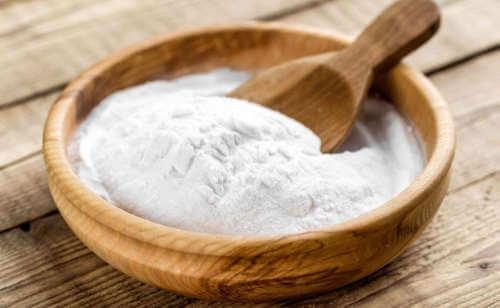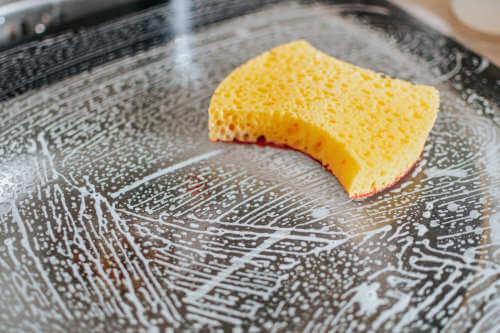Everyone knows sodium bicarbonate or baking soda. This very cheap white powder has been known for over a century. This product can really be considered a miracle product as it is used for so many things.
Contents :
Why talk about baking soda?
What is bicarbonate?
The 12 uses of bicarbonate to simplify your life and save money...
The impact of bicarbonate on the environment
1. Why talk about baking soda?
It still has, wrongly, an image of a " granny product " because it was part of the basic products of our parents and grandparents. Its qualities have not changed, but the marketing of mass distribution has gone through the motions, promoting the merits of very expensive specialised products that often barely match the qualities of baking soda.
Moreover, baking soda is completely safe and environmentally friendly. The same cannot be said of most of the advertised cleaning products. So, a grandma's product but terribly current! It has regained its rightful popularity in recent years but is still not well known.
Baking soda is a quality alternative for more sustainable consumption. Let's not deprive ourselves of it.
2. What is bicarbonate?
Bicarbonate is a chemical product with a simple formula: NaHCO3. Today, it is produced industrially almost everywhere in the world. Nearby, the major production sites are located in France, England and even Turkey. Depending on the care taken during the manufacturing process, there is 'food grade' bicarbonate, which can be used in food, or 'technical' bicarbonate, which is used for household tasks. It is basically the same product. Depending on the use, you can choose the granularity of the powder in certain brands: finer for food or cosmetic use, coarser for maintenance or gardening tasks for example.
Translated with www.DeepL.com/Translator (free version)

Bicarbonate does not exist in this pure form in nature. It is manufactured industrially from natural products which are limestone (calcium carbonate, or chalk), formula CaCO3 and rock salt (cooking salt), formula NaCl. It is then combined with CO2 and water to produce sodium bicarbonate.
Bicarbonate has a long list of very interesting properties:
Slightly abrasive : in powder form, it gently scours surfaces without scratching them, such as teeth, stainless steel and earthenware or flat glass.
Soluble in water : practical for a multitude of household applications.
Neutraliszes odours : by lowering the pH of the environment in which it is present, it prevents the release of bad odours; its porous structure absorbs the molecules responsible for odours.
Bacteriostatic and fungistatic : it does not kill bacteria or fungi, but it blocks their growth.
Chemical "buffer" function : it reduces the acidity of the solutions in which it dissolves and helps maintain a constant level of acidity (the pH).
Detergent : bicarbonate reinforces the action of cleaning products such as washing powder, black soap and dishwashing liquid by helping to soften and dissolve grease.
Raising agent : it is found in many baking powders.
3. The 12 uses of bicarbonate to simplify your life and save money...
There are many applications for bicarbonate. Here are the simplest and most effective applications. These will be described in more detail in our other blogs.
Bicarbonate is effective and economical in the following cases :
Cleaning the dishes. It helps to dissolve grease when it dissolves (in water) and softens organic matter (e.g. burn marks). In the dishwasher, it neutralises the limescale naturally present in the water, which increases the effectiveness of the cleaning product. Its slightly abrasive power (in powder form) helps to scour pots and pans without scratching. Do not use on aluminium.
Laundry. It reinforces the effect of the washing powder by neutralising limescale and helps to dissolve grease. As a rinse agent (with fabric softener), it neutralises persistent odours.
Cleaning of surfaces. Baking soda scours without scratching. For a very dirty oven, wet the walls with a highly concentrated solution of baking soda and leave it to work overnight. Then rub with a wet cloth..
Cleaning of sanitary facilities. Bicarbonate helps dissolve lime scale and scrubs without scratching, using a rag or sponge. If you need to remove mould, use a sponge or an old toothbrush. Do not rinse, as the bicarbonate prevents the growth of mould.
The glass of the insert (open fire) : Baking soda powder on a damp sponge will restore the transparency of your window.
Deodorising clothes. Sprinkled on smelly clothes, it captures odours and sanitises without damaging the textile (do not use on wool or silk). Ideal for removing cigarette odours (are there any left?) and perspiration from a jacket for example. And for the hoover whose bag is sometimes very smelly, suck in a little bicarbonate and that's it!
Reducing body odours. Bicarbonate is a common ingredient in deodorants (see below).
Deodorising a fridge. Bad smells can be persistent. A bowl of water and bicarbonate placed on the top board, near a possible fan, will be of good service for 3 months. Of course, this does not mean that the walls should not be cleaned regularly.
Remove odours in enclosed areas, such as a bedroom. The cup is also useful here. It is not a substitute for regular airing, but it does help to remove persistent odours..
And mattresses and pillows then ? Yes, it is! Sprinkle some bicarbonate powder, spread it with a brush or your hand. Leave for 4 to 8 hours before vacuuming. It deodorises and is active against bacteria and dust mites..
For DIY products : Bicarbonate is a very common component in "ecological" and do-it-yourself preparations. It can be found in even the most expensive and sophisticated deodorants. Indeed, its harmlessness, its capacity to absorb odours and prevent the development of bacteria make it an ingredient of choice. It is also found in laundry products, dishwashing products and some shampoos..
And finally the kitchen of course ! Indeed, from 60°, bicarbonate decomposes and releases CO2. This lightens preparations such as pasta and cakes. Bicarbonate tenderises food such as meat, reduces the acidity of certain vegetables (tomatoes) and fruit, preserves colours during cooking, and the list goes on..
Baking soda is clearly a miracle product. And it can replace many expensive products in our kitchen, laundry room, bathroom and even in our garage.
We have identified more than one hundred simple, economical, effective and above all environmentally friendly applications for baking soda. So we have a lot more to share.

4. The impact of bicarbonate on the environment
What about the impact on the environment?
Bicarbonate has no impact on the environnement. What other cleaning product can say the same?
Bicarbonate is produced in Europe from natural extraction products: limestone and rock salt (our table salt). These products are then combined with CO2 in the industrial manufacturing process.
In nature, bicarbonate is created naturally when CO2 from the atmosphere comes into contact with sea water. It is then consumed by oceanic fauna which uses it to make shells and external skeletons (crustaceans, corals).
When returned to nature, bicarbonate naturally breaks down into its ions in solution, which are universally present in almost all ecosystems and living beings. It is not toxic, of course. The CO2 released in some chemical processes is the CO2 that was absorbed during its manufacture.
5. To conclude
In conclusion, bicarbonate must be industrially manufactured and requires the extraction of natural resources. But its manufacture from local resources, its total biodegradability, its harmlessness and its zero impact on the environment make it a highly recommendable alternative to many expensive, over-packaged, largely toxic and heavily marketed products..
The choice is yours. Read our other articles for more tips.
